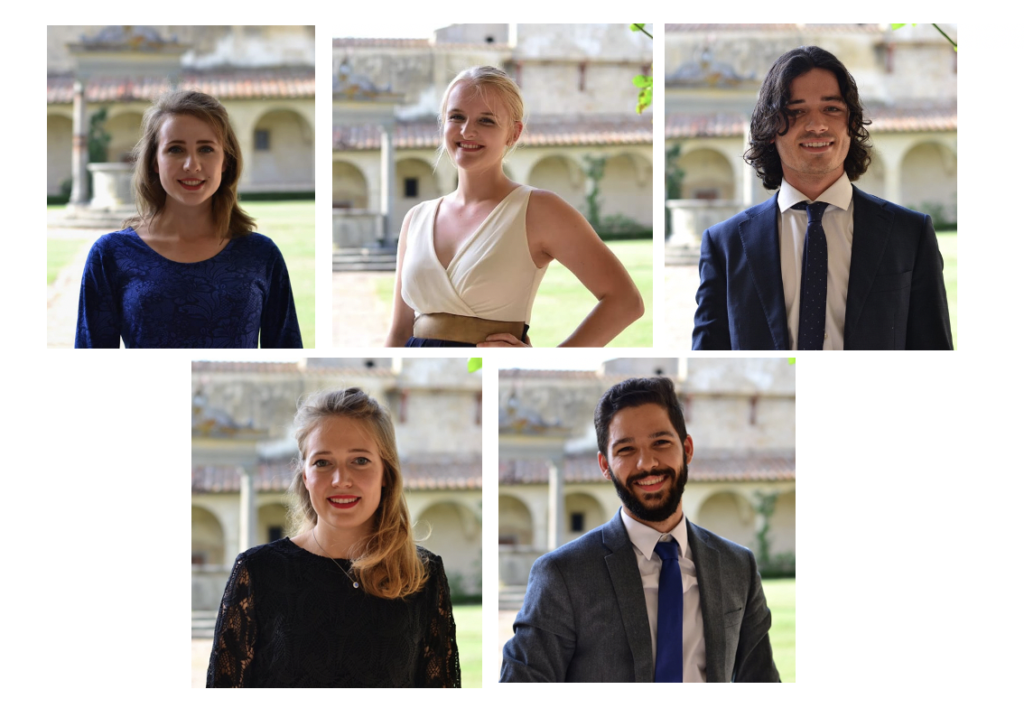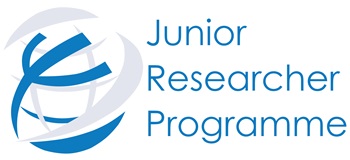Ludvig Daae Bjørndal and Lucy McGill share first authorship on a study about Norwegian judges’ knowledge of eyewitness testimony recently published in Psychiatry, Psychology and Law. Supervised by University of Oslo professors Tim Brennen and Svein Magnussen, they conducted the study along with their JRP supervisor, Renan Saraiva. and two of their fellow team members, Marie Stadel and Stéphanie Richardson. We talked to Lucy and Ludvig to hear more about how this project developed and the role of the JRP in enabling them to carry it out.
Access the study here.

Lucy McGill, Marie Stadel, Ludvig Daae Bjørndal, Stéphanie Richardson and Renan Saravia
What is your relationship to the JRP and what have you enjoyed the most about being part of the JRP?
Lucy: Ludvig and I were part of the 2018-2019 JRP cohort and were in the same research group. That project is still ongoing and we are nearly at the point of submitting for publication, which is quite exciting. So we are still very much in contact with our project group and we also both took part in the internship last summer. We have a wonderful team. Even in terms of social support through lockdown as we have kept in contact and had online meetings. And although they’ve maybe become less regular as everybody has become more busy, they always start with us chatting for like half an hour before we get down to work. So, I think the best part has been the people that I’ve met through JRP.
Ludvig: The academic support that is provided by the JRP Team creates an environment with the potential for good and proper research. That has just been super valuable for me personally. When I first applied to the JRP, I would never have anticipated all the opportunities that would come from the programme.
Lucy: From my perspective, it has also given me confidence that I can do research. Ludvig and myself kind of spearheaded this project and the JRP gave us the confidence needed to go ahead with it and supported us in how to go about it.
Ludvig: Yes, I think that is really important. I was in my 3rd year but I did not have much research experience when I joined the JRP. And it was great to then meet people with lots of research experience, but also some people with little. And there’s something about that which enables a lot of good thinking. Everyone has something to offer, and not just selecting people with a lot of experience is a big strength of the JRP as it allows people to learn from each other.
Lucy: Something I have also taken with me from the JRP is also the idea that research can be exciting. I had just finished my bachelor’s degree when I applied for the JRP. I felt so burned out from my thesis and it made me think that I wasn’t interested in research, but since joining the JRP it’s something that I really enjoy doing.
How did the idea of this project come to you, and how did it develop?
Lucy: In our initial JRP project, we looked at factors that affect eyewitness testimony in court. During the jMeeting in Madrid, when we were already six months into the project and had done a lot of background reading, we decided it could also be interesting to look at how well these eyewitness factors are known by legal professionals in different countries. And it was quite a unique opportunity as we had this cross-cultural group across seven different countries. And so that was the starting point and we played with the idea of doing a qualitative study for a little while but decided on quantitative. We then realized that getting in touch with judges or anybody working in a legal field is extremely difficult and a rather lengthy process, for just a few minutes of their time. Eventually, Ludvig hit a goldmine in Norway so we ended up being very lucky in terms of the access that we had to judges there through the Norwegian Judges Association.
Ludvig: Yes, we based the project on some studies showing that legal professionals seemingly have a lack of knowledge about many eyewitness factors. One particularly important study was conducted by a Norwegian professor called Svein Magnussen and it occurred to me that he was at my department at the University of Oslo. So I sent him an e-mail and asked whether he thought it would be interesting to look at knowledge levels now, 12 years after the original study was conducted. And he was super interested and put us in touch with another professor at my University called Tim Brennen and they helped get the ball rolling, and then we ended up with a pretty good sample of judges.
So who ended up being on the research team?
Lucy: The two of us, our JRP supervisor Renan Saraiva, and two of the people from our team, Marie Stadel and Stéphanie Richardson, were able to join. They did a huge amount of the statistical analyses and the coding as well as helped with the literature search and writing of the paper. They were invaluable from the start. So it was five of us from the JRP, and then the two professors at the University of Oslo that Ludvig mentioned.
Ludvig: We had a mix of JRP people and outside supervisors. They were also super impressed with the JRP and thought it was cool that there is something like this for early career researchers. So we had that cool mix of JRP members supervised by leading researchers in this field who had nothing to do with JRP. It really exemplifies how the JRP spins in all these different directions.
Would you be able to shortly explain the project and its main findings?
Lucy: We more or less replicated the study by Svein Magnussen 12 years after to see whether there has been a change in judges’ knowledge about eyewitness factors. We used the same format but with a few of the questions tweaked based on research that had come since them. Then we had to look to see whether there were any changes. Overall, there weren’t any drastic changes and the knowledge levels were fairly similar. However, with some individual items, we did see some changes. We found that judges are more aware of certain factors. Some of these were “system variables” meaning variables that can be controlled by the legal system itself. Another interesting finding was that we saw a shift in terms of how some items where there had been low correct responses in the previous study, there was an increase in judges saying they were unsure. As there is research ongoing in these areas, it is interesting to see whether research findings on eyewitness factors reach the legal field professionals.
Ludvig: So just to emphasize that overall, the knowledge levels twelve years ago and now are the same. But in line with the “JRP spirit” we still think follow-up studies are super valuable regardless of what they show. Having an updated data set showing the current knowledge amongst legal practitioners about such an important topic has value in and of itself.
Given how successful your collaboration and your teamwork has been, do you have any advice for the ongoing and new projects?
Lucy: I think what really helped our JRP team is us having a friendship as well as a working relationship. During jSchool and all of the times we have met in person we’ve had a good balance of work and socializing. I think taking the time to build these relationships even in an online environment is important to keep you enthusiastic.
Ludvig: Another thing which helped tremendously is that during jSchool we made a good plan on how the project should develop and how often we should meet. Seeing each other consistently has been super important and I think we met at least once a month during the first year. It kind of keeps things going. In general, in our group we also succeeded in that people were able to discover their strengths. I think we complemented each other well in the group and everyone was given the chance to work on everything. Our supervisor Renan has been really good at having us think about what we can contribute individually and that has helped everything flow very nicely.
Lucy: Yeah, Renan has managed that really well both in terms of our strengths but also in how he encourages us to work on aspects we want to improve on. So in that way the group environment both facilitated developing new skills as well as practising ones we are already good at.
Ludvig: I absolutely agree with that. Having the chance to learn and try new things really increases motivation. I studied clinical psychology and ended up with the help of Stéphanie and Marie to be running a lot of the analyses, which I never thought I would have been able to develop the skills for. But Renan has been really good to have us think about what our strengths are and what we want to improve on, and the result of that has been really good.
Lucy: And one last thing, there is also the human element that has been brought to it. If you did not have time to make the meeting one month it was completely fine. It was really acknowledged that everyone has their own things going on and that this is done in our free time. So I think we had a good balance of flexibility and still being able to get things done.
And to have a publication with our name as the first and second author at this stage in our career regardless of what direction we’re going is really exciting. Having been given the opportunity to do that is something that we’re both really grateful for.
Ludvig: So it only seems fitting that we – in the acknowledgement section of our paper – mention the JRP, which we did. It just seems right to do so because the JRP has meant so much to us and it continues to do so.

Ludvig, Marie, Lucy and Renan presenting their study in Cambridge.
